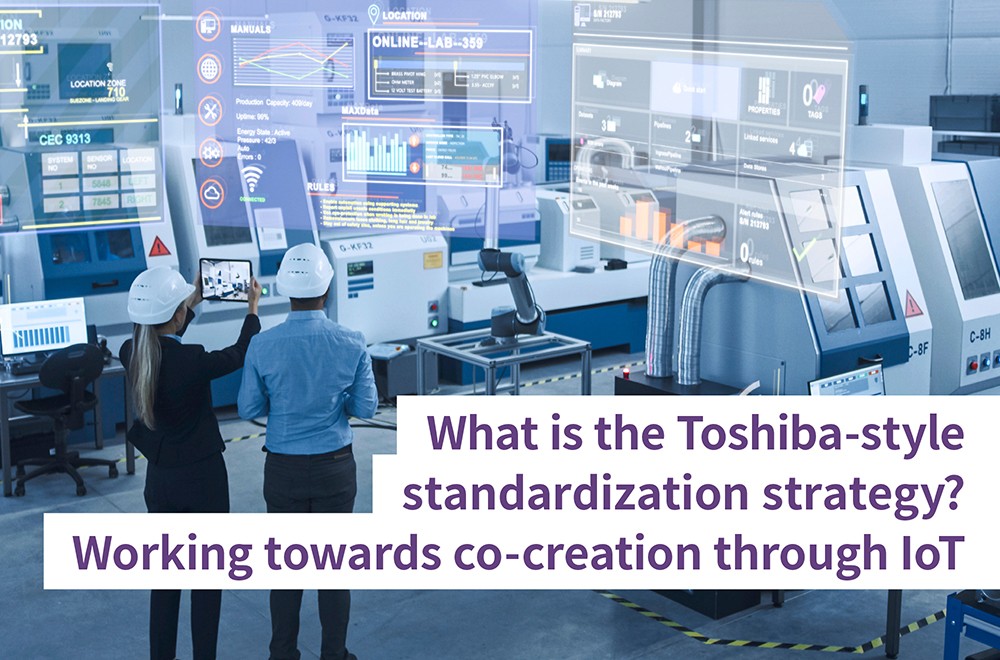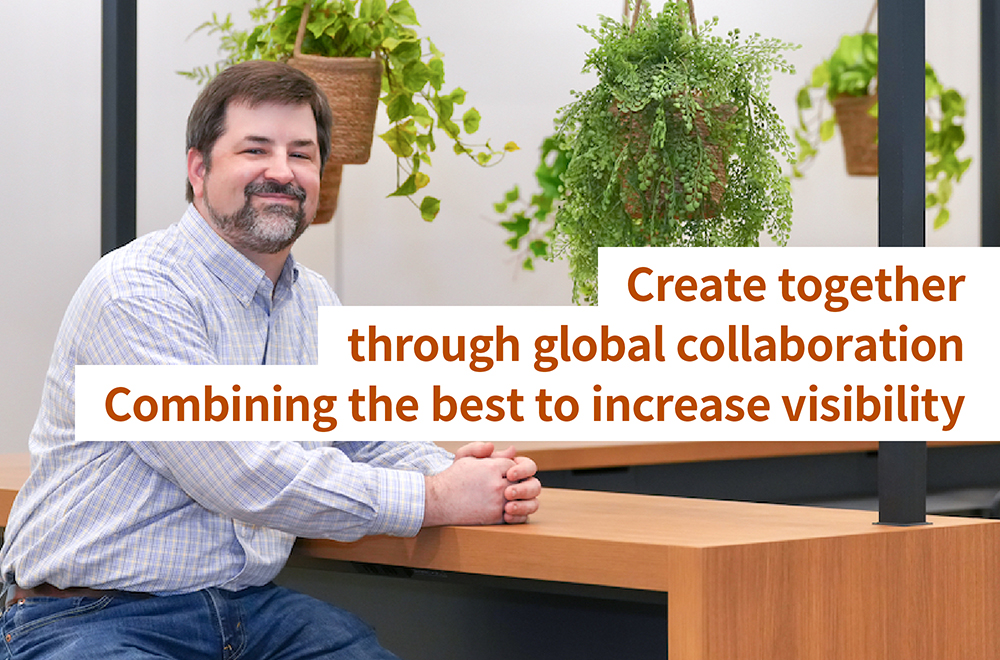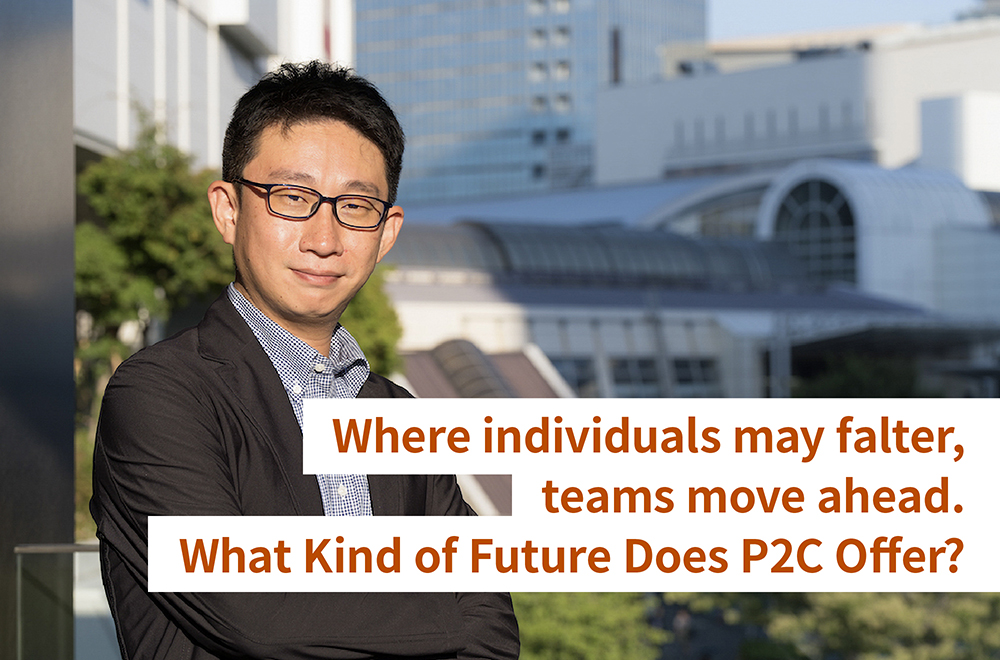Co-creating a New Economic Sphere in Unelectrified Regions -Contributing to productivity improvement in island countries through electric product sharing services
2025/03/11 Toshiba Clip Team
- Many places in the world are not electrified—that is a problem.
- Toshiba takes on the challenge of sharing electrical products that use renewable energy
- Co-creation with partners is a powerful way to solve real social issues
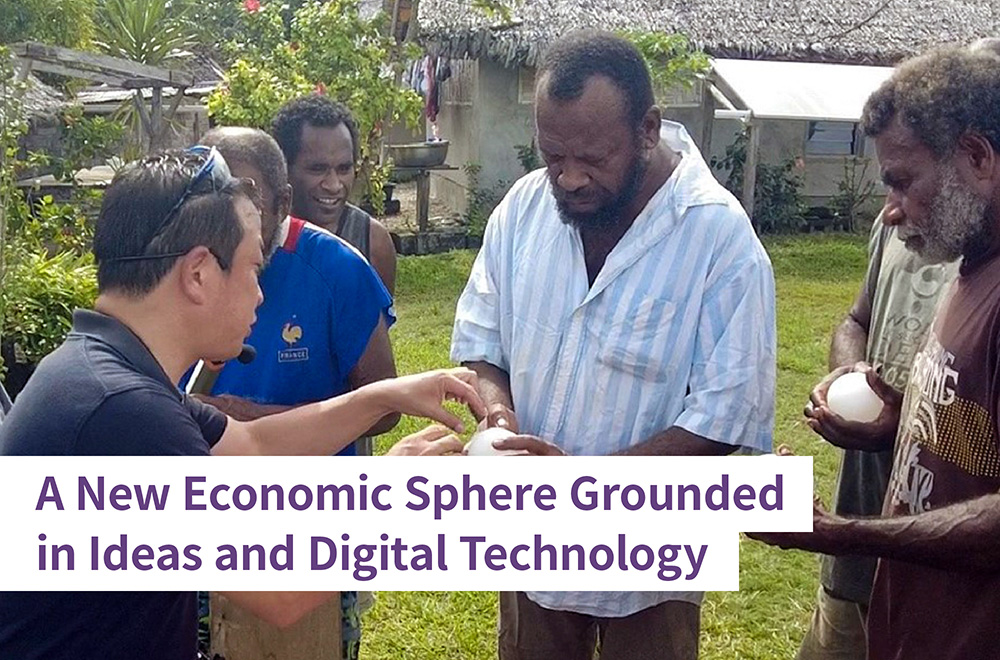
There are many places in the world that are still not electrified, where people cannot freely access and use electricity. That includes parts of the Republic of Vanuatu, a far-flung Y-shaped archipelago of over 80 islands, more than 1,200 kilometers from end to end, about 1,800 kilometers east of Australia.
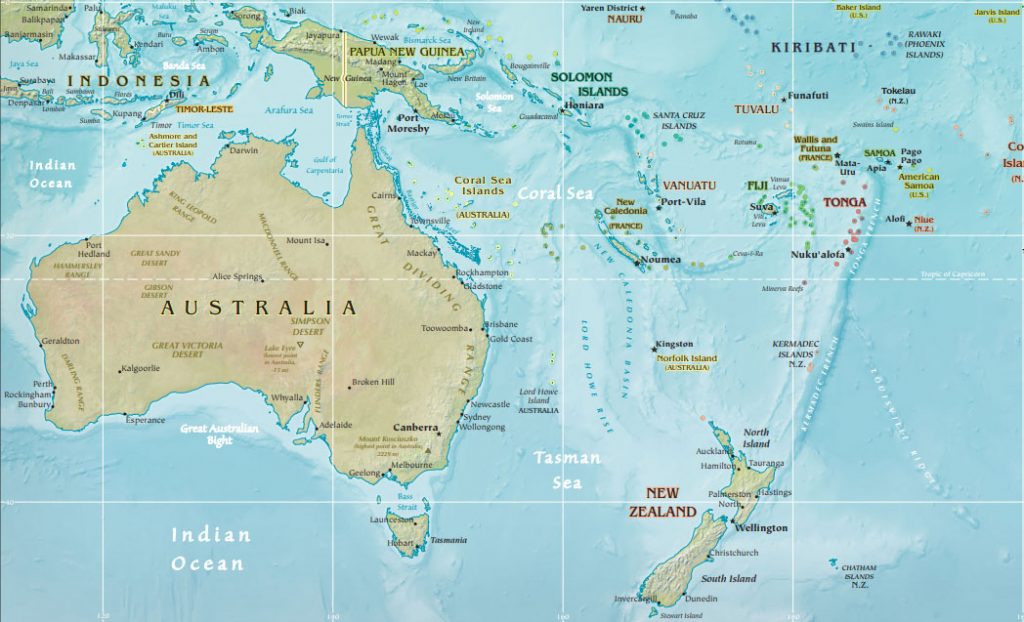
One of the major challenges of the United Nations Sustainable Development Goals (SDGs), one that must be met globally, is that of SDG 7: provide all people with affordable, reliable, sustainable and modern energy, including those in unelectrified areas of the world, and enable them to enjoy its benefits. It is a major target that will contribute to achieving other development goals, such as eradicating poverty. Toshiba offers a solution geared to this social challenge: “renewable energy x sharing services.” Following a service demonstration in Vanuatu’s Malampa Province, a project to do just this is finally moving ahead with implementation. The aim is to deliver environmentally friendly electricity to residents who are blessed with abundant nature and lead a self-sufficient life with a high level of happiness.
In this article, we talk to two people intimately involved in the project and its goals. Masao Suzuki, who has worked with Japan Overseas Cooperation Volunteers (JOCV), leads the project as his own. Kazuki Sato, who provides digital and design support, shares his thoughts on trials and errors, and his vision for the future. How will the co-creation of “things x digital design” bring light to the lives of people in unelectrified regions?
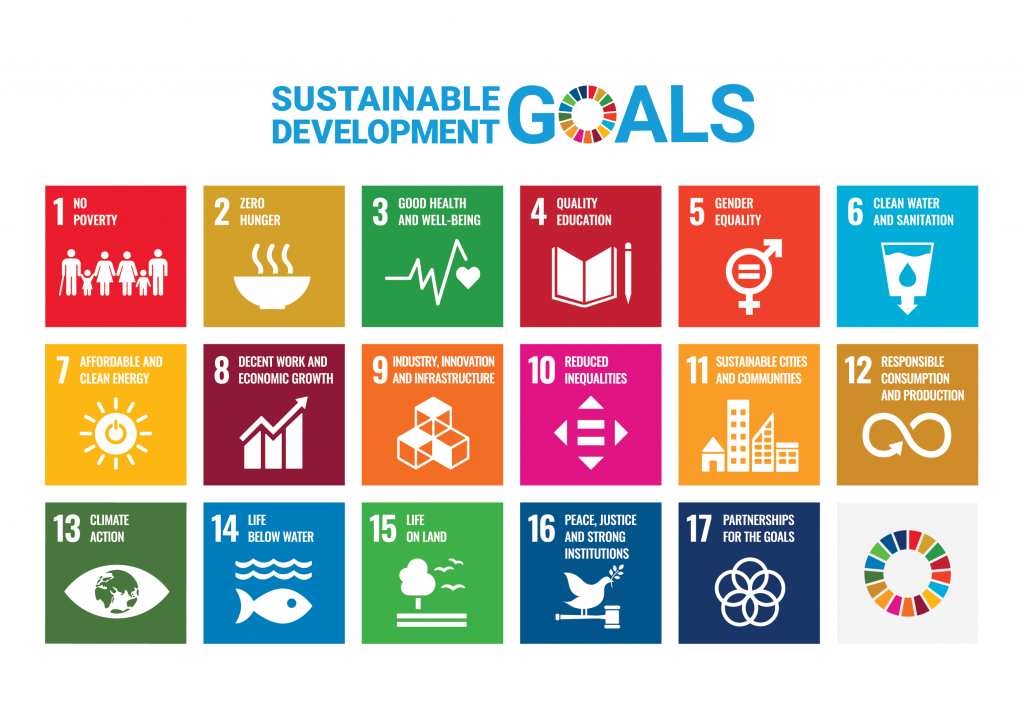
Autonomous solutions for unelectrified areas
In Japan and other modern societies, well maintained power plants and grids provide a stable electricity supply. But even today, there are parts of the world where many people still live without access to electricity, basically unable to use electrical products.
Answering the call of the SDGs, Toshiba is working on a sharing service for electrical products that are recharged with renewable energy. Suzuki, the project leader, told us about its origins and its name, Delighting Everyone Project (DEP).
“We are all vaguely aware that there are still many parts of the world that lack electricity,” says Suzuki, “But my experience with JOCV really brought home to me that solving this problem is a pressing issue. At Toshiba, we focus on the energy business and ensuring a stable supply of electricity. I felt a strong desire to see what we could do as an energy company to overcome this lack of electricity.”
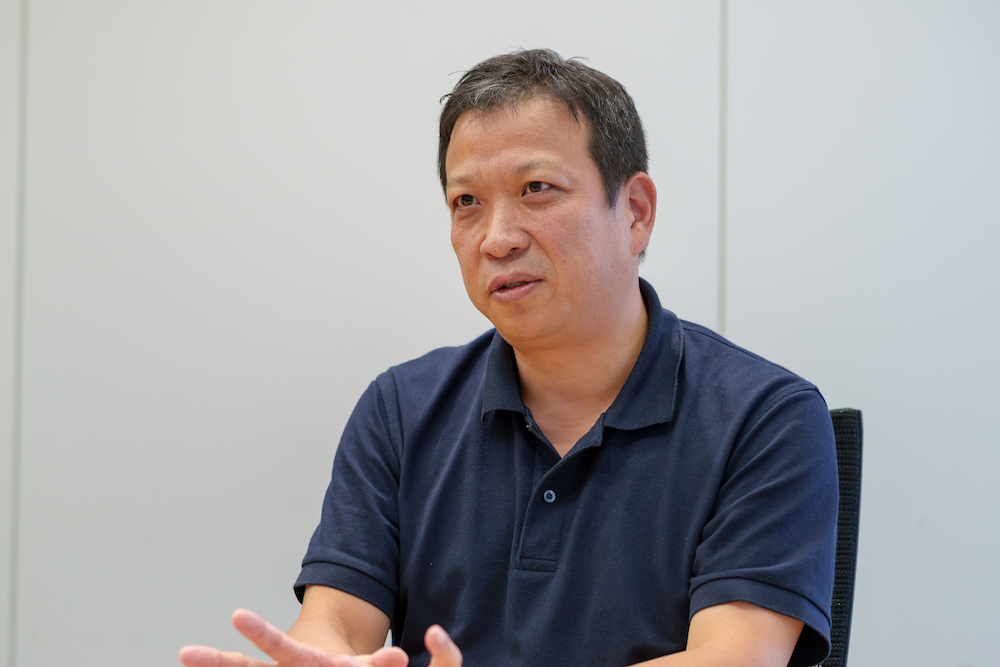
Suzuki’s focus is on island countries. They tend to be strings of islands, and it is difficult to construct power lines between them. For example, estimates are that Papua New Guinea has a population of approximately 9 million people without electricity, and in Vanuatu, the site of the current project, the number is approximately 200,000, approximately 2/3 of the population*. What drove Mr. Suzuki to solve the problem?
*: Calculated from the 2020 Vanuatu Census
“From 2002 to 2004, I took a two-year leave of absence from Toshiba and was a JOCV volunteer involved in village development in Vanuatu,” recalls Suzuki. “Even in those days, electrification had long been recognized as an issue in Vanuatu, and we were considering how to deliver electricity in the then current environment.
“Solar power generation was a candidate, but products at that time came with high user fees, and did not fit well with a culture of living self-sufficiently and enjoying the benefits of nature. On top of that, there was the burden of maintaining the equipment. After seeing this situation with my own eyes, I gave myself the homework of thinking about how we could arrive at an autonomous solution for the sustainable supply of electricity.”
Eventually, Suzuki returned to Japan and Toshiba, where a few years later he was assigned to the DX Department, a new organization dedicated to developing and promoting new businesses with the power of digital technology. He was tasked with promoting digital businesses and open innovation driven by manufacturing: value creation through digital transformation (DX). As this new momentum seeped through the company, Suzuki’s thoughts turned again to Vanuatu. He wondered if it could be possible to use energy infrastructure honed by Toshiba over many years in a proposal that aligned with the local situation. Suzuki’s combined his thinking with DX and the result was the launch of the Delighting Everyone Project, DEP.
The heartbeat of a new economic sphere supported by electrification
The essence of DEP is a business model that takes on the goal of electrification while respecting how the Vanuatans live their lives. In the first step, rechargeable LED lanterns, power generation and recharging equipment, including solar panels and batteries, and other electrical products, are brought into local communities. There, the small local stores that provide people with the goods they need for daily life rent out and receive returned equipment, providing the contact-point between residents and the service. Residents use a smartphone payment application to manage equipment loans and returns, and pay user fees at the stores, which unlock the products and allows access to a range of appliances.

Use fees collected by the storekeepers are remitted to a local mobile money operator. This operator pays compensation to the Toshiba-related service operator, with a reasonable profit that covers the costs of maintaining the equipment and systems. Various partner companies are expected to participate in the project, and alongside LED lanterns and the like the project will also handle agricultural equipment and home appliances. The power source will be renewable energy, and the DEP will be environmentally friendly and support autonomous electrification.
At this point, we need to bring in Kazuki Sato, who participates in DEP as a designer. Sato has supported the development of services, and the planning and execution of on-site demonstrations, working in collaboration with partner companies. He is responsible for giving shape to Suzuki’s ideas, and for clarifying the shape of the project as a business.
“Suzuki-san’s thinking and seeds of ideas realized value creation,” says Sato. “Now, we need to take steps that will ensure we move forward as a business. So we visited Vanuatu, to confirm needs and demonstrate the effectiveness of our business model.
“Even though the country as a whole is not electrified, LED lighting is beginning find popularity among people who can afford it. We realized that the service we are developing is significant as a system that allows people with low cash income to use electricity to light their homes and for work.”
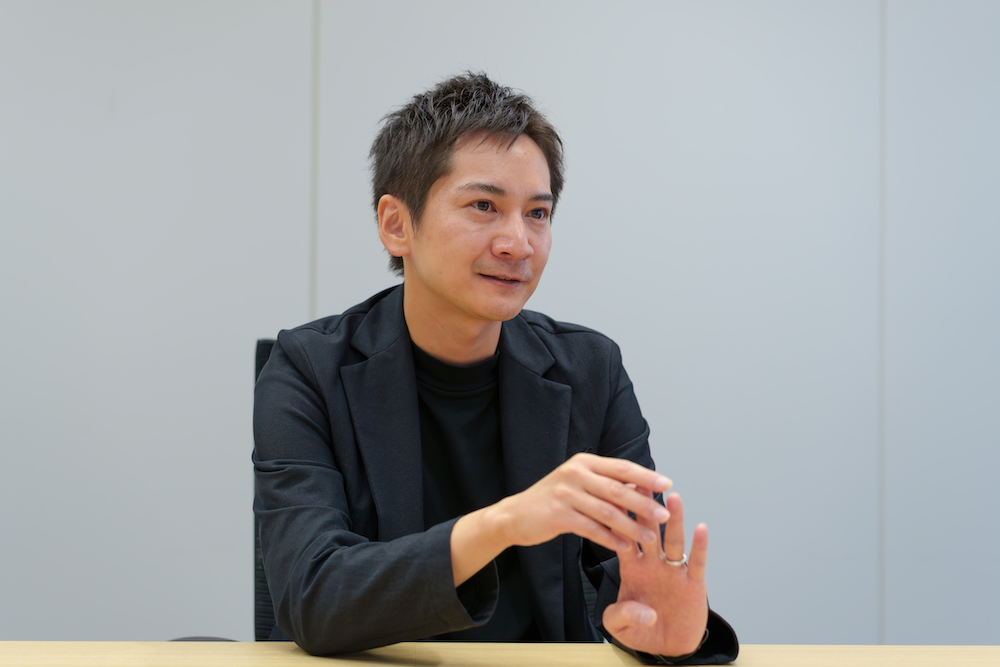
Of course, the government of Vanuatu is focused on building up the electricity supply, but most attention is given to urban areas, and it will take time to extend electrification to smaller, outlying islands. The Ministry of Energy has made clear a policy of promoting electrification without transmission lines, and confirmed that the DEP proposal of Suzuki and his team is a solution consistent with that policy.
In moving toward implementation, DEP decided to use Toshiba’s industrial IoT service, TOSHIBA SPINEX for Energy. Its capabilities include supports for cloud environments that handle personal information and payment apps for smartphones, a basis for safe, secure operations.
Suzuki explains why it was selected: “TOSHIBA SPINEX for Energy is a cloud-based environment that supports IoT services. The operation we envisage includes renting out valuable products and keeping information on the residents who use our services, so we really need a system that delivers stable data storage and secure operation. The software is also characterized by its ability to connect to a wide range of apps, and we hope to expand the platform to beyond sharing electrical products, into areas like financial credit, medical care, and other apps.”
As already noted, agricultural equipment and home appliances will be part of the DEP menu. With TOSHIBA SPINEX for Energy as a platform, the project anticipates support for a complex business model that can handle and support transaction data, sales networks, and settlement mechanisms. From the start point of electrification, a new economic sphere will emerge.
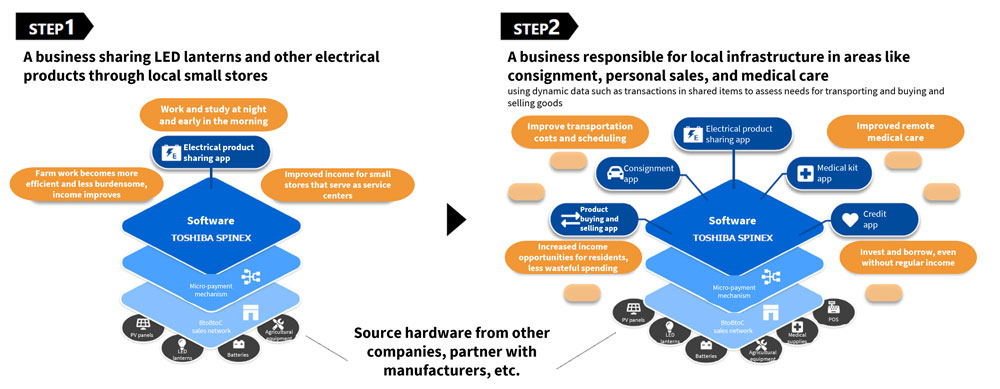
Co-Creation and Digital Partnerships Flourish in Oceania
The value created in unelectrified areas will grow from ideas incubated by Suzuki, Sato, and other promoters, services that meet local needs, and Toshiba’s technology. DEP brings together diverse stakeholders, including (a) consulting firm(s) that specialize in development projects in emerging countries, international organizations that support the economic development of Pacific island countries, and local partners.
“We designed a solution bases on micropayments, so that people can easily use it,” explains Suzuki. “The equipment and software provided by the contributing companies are only a means to an interim end. We envision solutions that go beyond that.
“We asked ourselves, ‘How can we make our services more acceptable in Vanuatu?’ We discussed this and research methods with partner companies familiar with the unique circumstances of emerging countries, and our design team went to Vanuatu to get a firsthand understanding of people’s perceptions. We shared all this with the overall team and had repeated discussions to ensure that the service would fit with the local environment and values.” Sato adds.
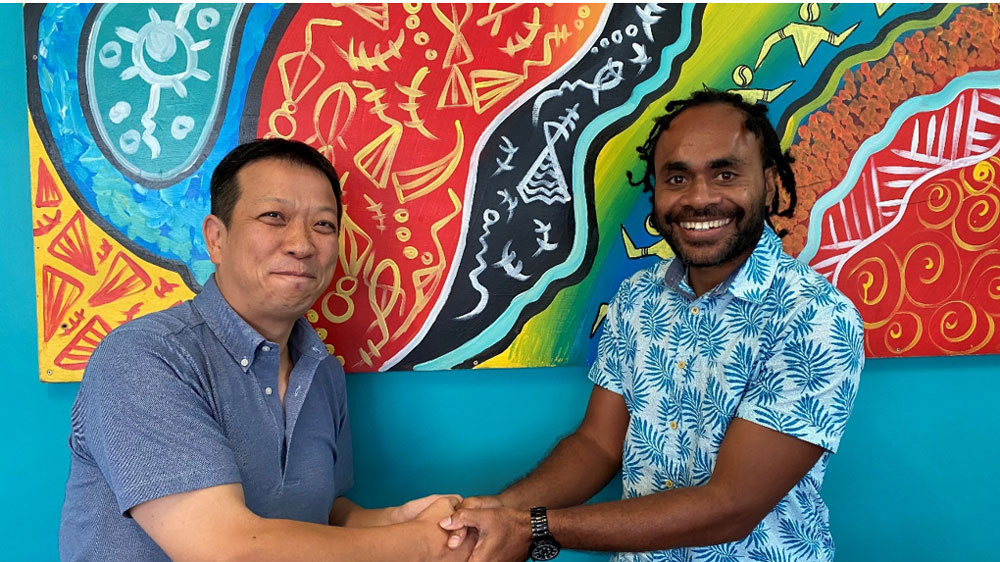
Suzuki also has thoughts on the significance of bringing together diverse stakeholders.
“The project is progressing through cooperation between international organizations and companies, and, of course, with the support and understanding of the government of Vanuatu. As we expand the menu beyond LED lanterns, manufacturers of tools and home appliances have high potential as partners. My hope is that we can work together to overcome social issues through co-creation, with a broad range of products, and with an eye on a reasonable profit.”
Suzuki and Sato are already looking forward to the next stage of the project: they want to use Vanuatu as a step forward toward working with other countries in Oceania, and to end the issue of non-electrification in the Pacific Ocean. Their aim is to deliver electricity to the furthest reaches of remote island countries, as the first step to building a future that considers both people and the earth.
“I realize that this approach is very different from the energy business that Toshiba has cultivated,” says Suzuki. “But what is unchanged is that our refined technologies will pave the way for a sustainable tomorrow and contribute to society. By focusing on electronic products, we will provide services that support people in their daily lives. We want to create more and more value.”
“Electricity provides the foundations for life and industry,” observes Sato. If we want to build infrastructure that everyone can enjoy, and deliver electricity to all walks of life, we need to consider the local environment and circumstances. That means we do not just develop and maintain large-scale power systems—we need to recognize that small-scale, decentralized initiatives can also be effective. Rather than being ahead of the curve in technology, I hope to develop a business that is accepted by the local community.”
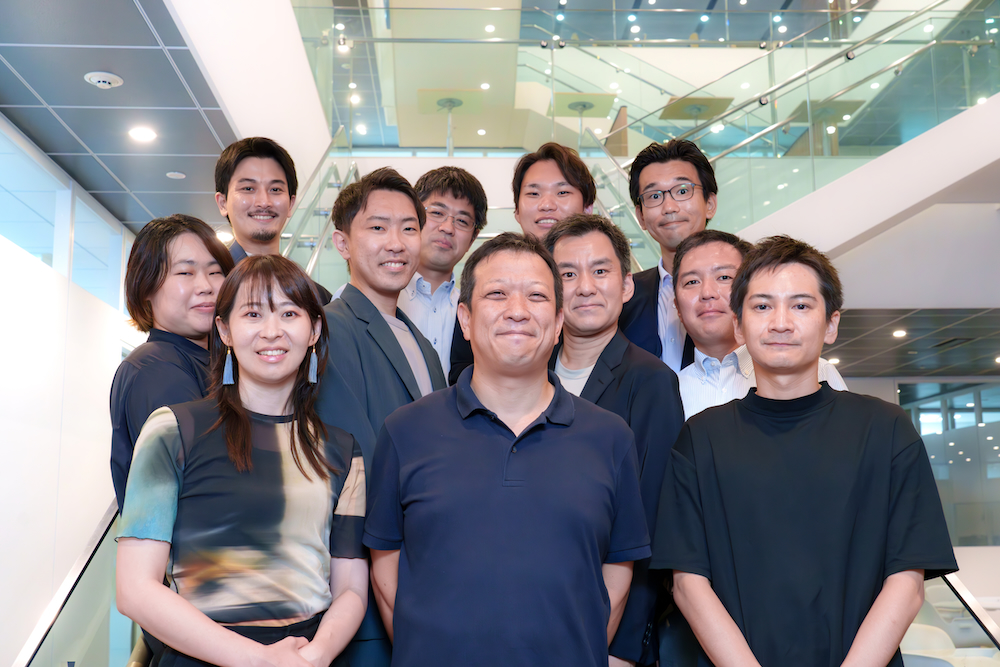
* Note: Departments and titles are as at the time of interviews.





